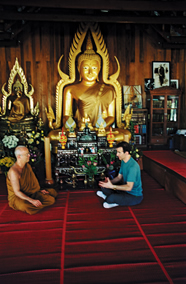


 |
Issue Contents :: Feature :: Being A Monk :: Page [ 1 2 3 4 ]
Did you consider yourself an unhappy person?
I think everybody in college considers themselves unhappy.
 Did
a light bulb go off in your head during that winter term? Did you suddenly
decide, "I'm becoming a monk!"
Did
a light bulb go off in your head during that winter term? Did you suddenly
decide, "I'm becoming a monk!"
I wanted to go to Thailand with the Peace Corps. Instead, I went with the Shansi program with the idea that I'd find a meditation teacher and learn a few basic skills. At the end of my Shansi term, I met Ajaan Fuang, a member of the Forest tradition, who became my teacher. I was going to extend my time in Thailand, but I caught malaria. So I disrobed and came back.
I planned to get my graduate degree in religion and teach Buddhism. I went
to an American Academy of Religion conference in Chicago, where the three big
names in Thai Buddhism gave presentations. About 10 people showed up. And there
was no dialogue going on at all. I thought, "I can't do this with my life." I kept thinking about Ajaan Fuang on his hillside with not much to his name–yet
perfectly happy.
So you returned to Thailand. Did you intend to become a monk?
You really have to be a monk to have a full-time opportunity to meditate. You have whole days to yourself to work on your greed, anger, and delusions. It seemed like an ideal situation.
I stayed with Ajaan Fuang for another 10 years. I became his attendant, the monk who looked after him when he was sick. Before he died in 1986, he made it known that he wanted me to take over the monastery in Thailand. There was no precedent for a Westerner taking over a temple that had been founded by and for Thai monks, so it was pretty controversial.
By the time I was offered the position of abbot there, so many strings were attached that it would have been all responsibility and no authority. It was then that Ajaan Suwat sought me out and asked me to help him here in California.
Ajaan Suwat is a Thai monk who founded a Buddhist Forest monastery in a suburb of Orange County, California.
They tried to maintain the traditions of a Forest monastery. They planted a lot of trees to make it a nice, foresty kind of place. But the city environment had taken over. Ajaan Suwat had begun looking for a new place in a forest and had identified this spot near San Diego. A young man who had just come into an inheritance offered to buy it. Ajaan Suwat asked me, "Are you going to come help me with this? If not, I can't accept the money. Because I can't run two monasteries at once."
I didn't have to think twice. I said, "Yes."
What's a typical day like for you? It's 8 a.m. and the alarm goes off…
I get up at 4.
You set your alarm for 4 a.m?!
I pretty much just wake up now. If I had a long night the night before, maybe 5. Then I get up and meditate for about two hours.
By yourself or with a group?
By myself.
Are there ever days when it's difficult to drag yourself out of bed?
There are times when I say, "I think I'll do some lying-down meditation."
I'd be great at that.
It's legit. For me, the early morning is the best time to meditate. There's always the thought that if I don't get up and meditate now, I'll miss this chance. It's still cool outside. There's an extra-quiet atmosphere.
I meditate until dawn, and then I come here [to the common area by the temple] and help sweep and clean up with the other monks.
Does a gong go off, or do you just know when it's time to stop meditating?
I know. And I have my little beeper watch.
In Thailand, monks go for alms rounds every morning to get food, leaving the monastery and carrying a bowl into which people put food. What happens in San Diego? Do you hop in an SUV and drive through the local suburbs?
We go with our bowls to the guesthouse. People prepare food in the kitchen.
Who's there?
People who are visiting the monastery and meditating, candidates for the monkhood. A young guy who works in the orchard is sometimes there. We also have Thai and Laotian people who come up just to present food.
You get one meal a day. Are you getting enough fiber? Are you getting enough protein?
I weigh 30 pounds more than when I graduated from Oberlin.
But don't you get hungry?
That first year in Thailand was hard, as my body was adjusting to the change in diet and metabolism. I was in a very ascetic mood, so I didn't mind that I got really thin. Part of me was sick and tired of America. I wanted to go to a place with a natural, pre-modern lifestyle. Thailand was about as pre-modern as you could get.
One morning, as I was going on my alms round, it struck me that I was living a hunter-gatherer's lifestyle. We were not allowed to store food; we didn't grow crops. We ate what we got that day, that's it. One hour a day is dedicated to food, and then you're free for the rest of the day.
Next Page >>